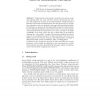Free Online Productivity Tools
i2Speak
i2Symbol
i2OCR
iTex2Img
iWeb2Print
iWeb2Shot
i2Type
iPdf2Split
iPdf2Merge
i2Bopomofo
i2Arabic
i2Style
i2Image
i2PDF
iLatex2Rtf
Sci2ools
118
click to vote
EUROCRYPT
2000
Springer
2000
Springer
Efficient Receipt-Free Voting Based on Homomorphic Encryption
Voting schemes that provide receipt-freeness prevent voters from proving their cast vote, and hence thwart vote-buying and coercion. We analyze the security of the multi-authority voting protocol of Benaloh and Tuinstra and demonstrate that this protocol is not receiptfree, opposed to what was claimed in the paper and was believed before. Furthermore, we propose the first practicable receipt-free voting scheme. Its only physical assumption is the existence of secret one-way communication channels from the authorities to the voters, and due to the public verifiability of the tally, voters only join a single stage of the protocol, realizing the "vote-and-go" concept. The protocol combines the advantages of the receipt-free protocol of Sako and Kilian and of the very efficient protocol of Cramer, Gennaro, and Schoenmakers, with help of designated-verifier proofs of Jakobsson, Sako, and Impagliazzo. Compared to the receipt-free protocol of Sako and Kilian for security parameter (...
Cryptology | EUROCRYPT 2000 | Multi-authority Voting Protocol | Receipt-free Protocol | Voting Scheme |
Related Content
| Added | 24 Aug 2010 |
| Updated | 24 Aug 2010 |
| Type | Conference |
| Year | 2000 |
| Where | EUROCRYPT |
| Authors | Martin Hirt, Kazue Sako |
Comments (0)

